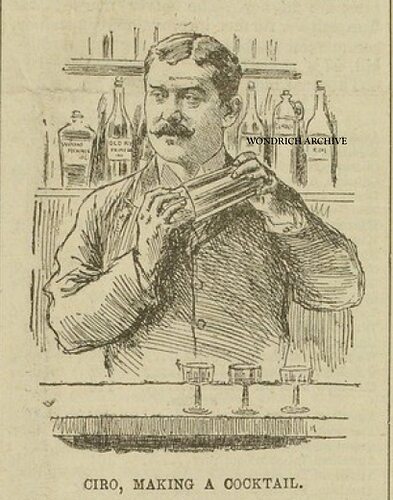Well, there’s this, from 1898.
Wrote the first cocktail book from Boston, the first American drink book to contain the Dry Martini, and wrote some cooking books as well. Was apparently influential in the Boston scene, and according to two recent bar guests, he gave talks at Harvard (they had their parents’ signed copies of Muckensturm’s books after attending a talk Louis gave). Louis died in 1918 and never got to witness the Marliave continuing on as a speakeasy. What Prohibition couldn’t do to shut down that 19th century powerhouse, the Pandemic did.
This is the current blurb we have for Muckensturm. That anecdote about him speaking at Harvard is intriguing! Thanks for the year of death. That enabled me to find this notice in the Boston Post:
BOSTON POST, TUESDAY, OCTOBER 1, 1918 SERVICES HELD FOR LOUIS MUCKENSTURM Funeral services for Louis Muckensturm, known far and wide as a Boston restaurateur, who died from the grip, were held yesterday in the Church of the Notre Dame des Victoires on Isabella street. Mass was said by the Rev. E. Bertram. was 42 years old, and was born in Alsace
Found cemetery:
The cemetery doesn’t contain his plot location information and wants $10 mailed in with a request letter for them to find it. Buried in the same small cemetery as the Kennedy clan, various Boston mayors, and political figures. Too many plots to just meander, although the map does show a German section (depending on whether they considered Alsace was German or French…).
So far the biggest Boston cocktail-related “celebrity” grave that I’ve found is ice king Frederic Tudor’s which is in one of the cemeteries in downtown Boston. Sadly, not too many other pre-Prohibition Boston drink makers or related that I know of besides Tom Hussion (Locke-Ober bartender who the Ward 8 is attributed to) despite Boston being a very wet town.
Also, Louis wrote another book Louis’ Every Woman’s Cook Book. It was unclear which my guests inherited since both cook books have similar covers to the drink book (they said that it looked like a match set).
Sorry for reviving this topic, not sure where this would fit but, since we’re talking about relevance, I thought interesting to let you know that Frank Meier is now the main character in a novel. It was released in France in the spring and the launch got some air time on mainstream television and was covered in most of the press.
The author, Philippe Collin, is an actual historian and famous radio / podcast host who worked a lot on figures of the same era (Pétain, Céline…) so my assumption was that the research would be sound. I haven’t read the book yet (I was just made aware of it yesterday) but going by the couple of interviews I’ve read or watched, he’s been at it for a decade and has had access to files none of us have had access too, so some interesting nuggets might be found.
It’s only in available French but I suppose @Splificator will be interested.
All topics on this forum are intended to be revived as needed. ![]()
May I respectfully propose that Frederic Tudor be added here? Since (as is noted on your excellent timeline) “ice gradually becomes cheap and ubiquitous in American bars through the domestic ice trade” with the resulting ability to create individual iced drinks (the “fancy drink”or cocktail as we have known it since?), recognizing Mr. Tudor as a driving force in making ice “cheap and ubiquitous” is appropriate— in some respect, he could be regarded as the father of the cocktail(?).
A good call, particularly since he actively promoted the use of ice in bars.
I dunno, that’s kind of like putting the guy who invented the novelty backscratcher on par with Joe Scialom….
I suppose one could argue that what Tudor did was inessential because it was inevitable—i.e., somebody else would do it, or it would be obsoleted by technology. On the other hand, Tudor took great (crazy) risks and led by example, arguably accelerating both the general supply of ice and the market demand (expectations) by decades (as much as 30-50 years), and his effort overlaps—not coincidentally—with nearly the entire infancy of cocktails. My understanding is that like ice remained relevant until around WWI, when electromechanically-produced ice finally was efficient enough to fully supplant it.
